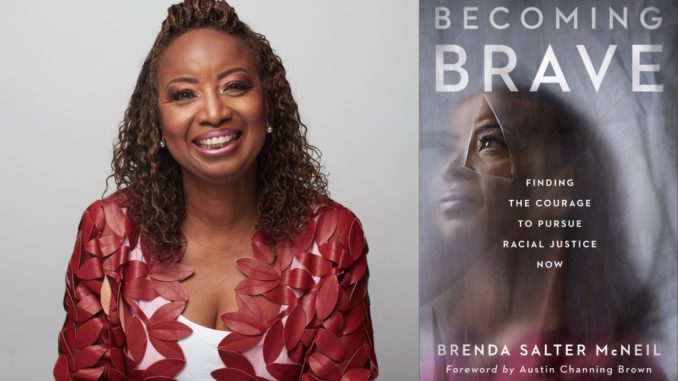
Podcast (beyond-the-page): Play in new window | Download
Subscribe: Apple Podcasts | RSS
I’ve done hundreds of interviews and this is one of my favorite conversations of all time. Dr. Brenda is an absolute delight and it was an honor to speak with her about racial justice, particularly as it pertains to the events of 2020. Usually, when I edit promotional clips, I have a pretty good idea of what section I’m going to use. For Dr. Brenda, I ended up re-listening to the entire conversation. You don’t want to miss out.
The Conversation | Dr. Brenda Salter McNeil
This excerpt has been lightly edited for brevity and clarity. You can listen to the full interview by clicking the play button above or subscribing at Apple Podcasts, Stitcher, Spotify, or wherever you listen to podcasts.
Josh Olds: I want to begin by just simply acknowledging that this is not easy work. What you do, what you have devoted your life to, is difficult, and even more so in this year. I want to say at the outset, the strength that you have to purposefully take this up day by day, and your unflagging commitment toward racial reconciliation is something that I really, really admire.
Dr. Brenda: Wow, that’s kind of you to say. In the podcasts that I’ve done, I think you may be the first person who has acknowledged that this is really tough and we are living in a time that has so much divisiveness, and it’s fueled with so much lack of trust, and a sense of winners and losers and choosing sides and polarization, and then fueled with the political climate—It is tough, and it’s tough to try to do this in a way that is without guile, without any attempt to hurt anybody, but an attempt to rally the church. And so thank you for noting that this is a tough time to do this particular type of calling.
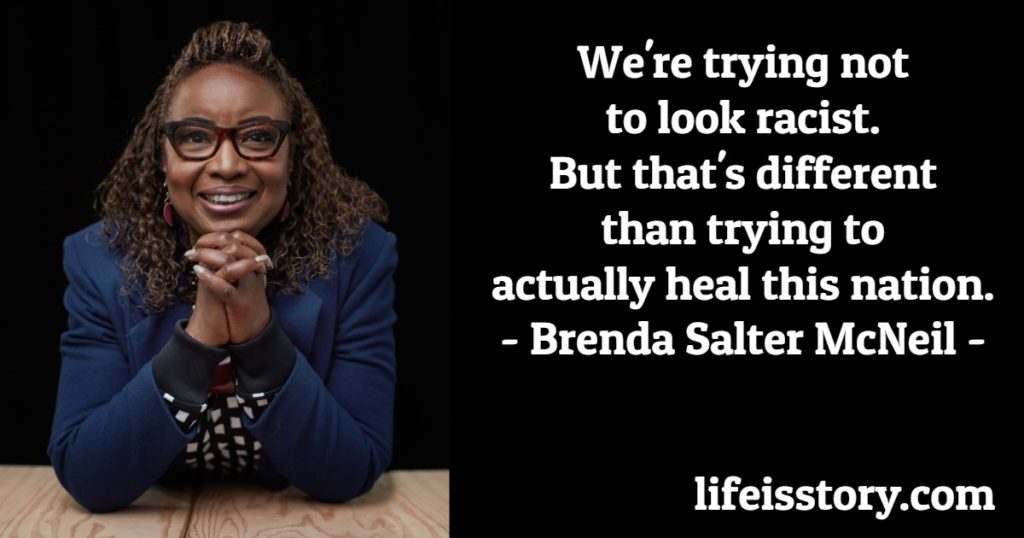
Josh Olds: As a black person, you don’t really have a choice to deal with some aspects of racial reconciliation. You know, it’s just going to be part of your identity. For you in particular, I think Ferguson was a change in how you kind of felt about reconciliation personally, and how you dealt with it in your work as a pastor, as an academic, as a speaker. Can you tell me a little bit about how that change how that changed you?
Dr. Brenda: Yeah, it was life changing. It was life changing because I I’ve come to believe—and the first person I heard say this was Bryan Stevenson—he talks about the importance of becoming proximate, getting close enough to a situation where you see it for yourself, you hear the truth for yourself, and it doesn’t come filtered through someone else’s lens, regardless of whatever echo chambers that continue to reinforce what we already think and believe. For me, Ferguson was an opportunity to get close to what was being reported as violence and uprising and, you know, anarchy and anything else. And you see these pictures on the news, and you don’t know what is this about. What is happening and what is all of this? I am old enough to have lived through—I was a teenager—civil rights and I saw protests. I saw Vietnam, I saw the kinds of brutality and violence and looting and rioting. Now all these years later, I needed to come clear on what is that is happening in Ferguson.
So it was a group of clergy and several other faith leaders from various perspectives who came to Ferguson together by the invitation of Sojourners in Washington, DC, to literally see for ourselves as people of faith. What are these young people talking about? What is it that actually happened to Michael Brown? How are they putting it back together after this tragedy? Why was he in the street for hours laying in the middle of the street? What should the church do about this? That’s what I think was the beginning of it. That caused me to really come to the conclusion that I couldn’t avoid this. This was not some rabble rousing people in the streets. These were people who had a horrific shooting, and had cried out, I think, for the attention of the world to see the pain of this. So as clergy, I felt like I was close enough now for the first time in my life, to literally see it, touch it, walk in it, and experience it for myself.
Josh Olds: And that that sort of kick started this aspect of your ministry and then Becoming Brave is about what you’ve learned in that process. And particularly what you have learned through that process, and how to how to approach the work of reconciliation. The exegetical heart of the book is the story of Esther and how she is forced to hide her ethnic identity, but then has to reveal herself in order to save her people. How did you find that story relating to your own?
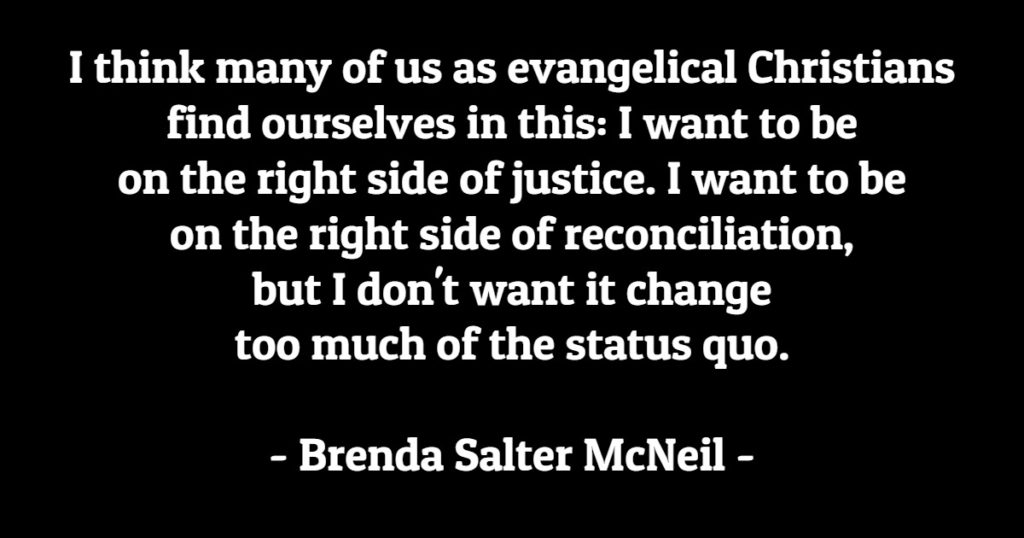
Dr. Brenda: Yeah, well, Esther, I think relates to all of us. And for me, I have been preaching and teaching and working for reconciliation from a Christian perspective for over 30 years. So I’ve been doing this for a long time. And I am not shy and reserved. And nor have I been timid. You know, I have been pretty clear about the call of God on the people of God. To the ambassadors of reconciliation, I’ve said it over and over and over again. But what changed to Becoming Brave is I tried to do it in a non-threatening way.
So Esther finds herself in a political, social climate that is demanding leadership, but she is trying to figure out “How to I live in this palace where I have been given access to power and privilege? And I have a position I didn’t go looking for but here I am. So but I don’t want to reveal or become threatening in this environment because the Queen before me who stood up for herself is no longer here. She was banished.” And so I think many of us as evangelical Christians find ourselves in this. I want to be on the right side of justice. I want to be on the right side of reconciliation, but I don’t want it change too much of the status quo that would cause me to appear as if I’m some kind of a threat or a violent person or an angry person.
And so for me, the way that showed up is that I didn’t talk about controversial issues directly, because I knew that they were hot button topics that would cause a sense of divisiveness and a sense that people would think that I had some political motive that I was trying to push, right? So I didn’t bring up immigration, I didn’t bring up abortion. I didn’t bring up sexuality, because I know that those are types of topics that people kind of put you in a camp: liberal or conservative, or whatever the moniker becomes. That was what I was trying to avoid. I wasn’t trying to avoid preaching with power, nor was I trying to avoid being prophetic. But I was trying to respect the breadth of the audience that I was speaking to, in hopes that if I could convince them that this was biblical, and not anything politically motivated, that somehow the people of God would hear the Word of God, and would begin to live like that, but that didn’t happen.
The Book | Becoming Brave
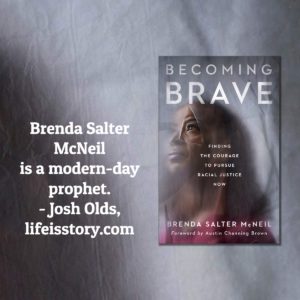 Reconciliation is not true reconciliation without justice! Brenda Salter McNeil has come to this conviction as she has led the church in pursuing reconciliation efforts over the past three decades. McNeil calls the church to repair the old reconciliation paradigm by moving beyond individual racism to address systemic injustice, both historical and present. It’s time for the church to go beyond individual reconciliation and “heart change” and to boldly mature in its response to racial division.
Reconciliation is not true reconciliation without justice! Brenda Salter McNeil has come to this conviction as she has led the church in pursuing reconciliation efforts over the past three decades. McNeil calls the church to repair the old reconciliation paradigm by moving beyond individual racism to address systemic injustice, both historical and present. It’s time for the church to go beyond individual reconciliation and “heart change” and to boldly mature in its response to racial division.
Looking through the lens of the biblical narrative of Esther, McNeil challenges Christian reconcilers to recognize the particular pain in our world so they can work together to repair what is broken while maintaining a deep hope in God’s ongoing work for justice. This book provides education and prophetic inspiration for every person who wants to take reconciliation seriously.
Becoming Brave offers a distinctly Christian framework for addressing systemic injustice. It challenges Christians to be everyday activists who become brave enough to break the silence and work with others to dismantle systems of injustice and inequality.
The Author | Brenda Salter McNeil
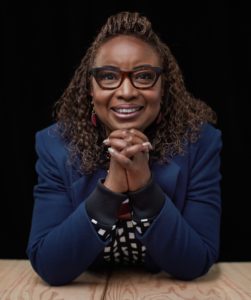 Rev. Dr. Brenda Salter McNeil is a dynamic speaker, author, professor and reconciliation thought leader. Her mission is to inspire, equip and empower the next generation of Christian leaders to be practitioners of reconciliation.
Rev. Dr. Brenda Salter McNeil is a dynamic speaker, author, professor and reconciliation thought leader. Her mission is to inspire, equip and empower the next generation of Christian leaders to be practitioners of reconciliation.
Dr. Brenda is an Associate Professor of Reconciliation Studies at Seattle Pacific University, directing the Reconciliation Studies program. She is also the Associate Pastor of Preaching and Reconciliation at Quest Church in Seattle.
Dr. Brenda is an international trailblazer, leading individuals, communities, and organizations to biblical reconciliation. She was featured as one of the 50 most influential women to watch by Christianity Today in 2012.
She is the author of Roadmap to Reconciliation 2.0, A Credible Witness: Reflections on Power, Evangelism and Race (2008), and The Heart of Racial Justice: How Soul Change Leads to Social Change (2005), coauthored with Rick Richardson. Her newest book Becoming Brave: Finding the Courage to Pursue Racial Justice Now is available August 2020.
